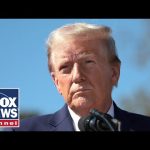In a surprising twist to the tech world, Facebook founder and Meta CEO Mark Zuckerberg recently had a sit-down with former President Donald Trump at his Mar-a-Lago resort. This meeting has sparked considerable buzz, especially as Big Tech prepares for Trump’s anticipated second term. With influential figures in the tech industry, like Elon Musk, making moves to protect free speech, the question lingers—what does this mean for social media giants like Facebook, Google, and Amazon?
Brendan Carr, the FCC Commissioner and a Trump appointee is gearing up for a significant role in ensuring that free speech rights for Americans are respected. During a recent interview, Carr emphasized that his primary goal is to combat tech censorship. He firmly believes that a variety of views should not just exist but be celebrated. The tech world, particularly platforms like Facebook, has often been accused of silencing voices that don’t align with a particular narrative. Carr sees it as his mission to dismantle what many have termed a “censorship cartel” that has allegedly colluded to filter out ideas diverging from a mainstream agenda.
Censorship, Carr argues, is not merely about wiping away words; it’s about the suppression of ideas themselves. He envisions an America where free speech flourishes, echoing the country’s founding principles of innovation and boundary-pushing. It’s no secret that when people are silenced, society loses out on potential advancements and discussions that could lead to new ideas. The hope is that, with the right moves in place, the U.S. can loosen the grip of government control over discourse, paving the way for a vibrant exchange of thoughts and opinions.
However, the left doesn’t seem to be on board with this particular train. Critics argue that instead of stepping back from platforms like X (formerly Twitter), individuals should engage in dialogue. Brendan Carr agrees that the foundation of democracy rests on diverse opinions. Yet today, trust in traditional media outlets appears to have plummeted. Even prominent figures like Jeff Bezos have noted that public confidence in mass media is at an all-time low, leading many to question whether robust exchanges of ideas are genuinely happening or if people are merely talking past each other.
One crucial hurdle for the Trump administration will be addressing platforms like TikTok. Previously, Trump considered banning the app altogether but later reversed his decision. Moving forward, Carr mentioned that the administration will follow Trump’s lead on how to handle this contentious issue. The current strategy appears to focus on increasing competition with major players like Facebook. He highlights the importance of what Elon Musk has initiated at X, emphasizing the need for a shift towards more freedom of speech and less government intervention.
As the conversation around these critical issues continues to unfold, one thing is certain: the approach that President Trump and his team take will be pivotal in shaping the future of free speech and tech regulation in America. There’s undeniable energy among supporters who believe that a second Trump presidency could lead to significant changes in how communication is handled and ultimately foster healthier exchanges of ideas that could benefit everyone in the long run. What remains to be seen is how technology companies will respond and adapt to this new landscape of potential change.




